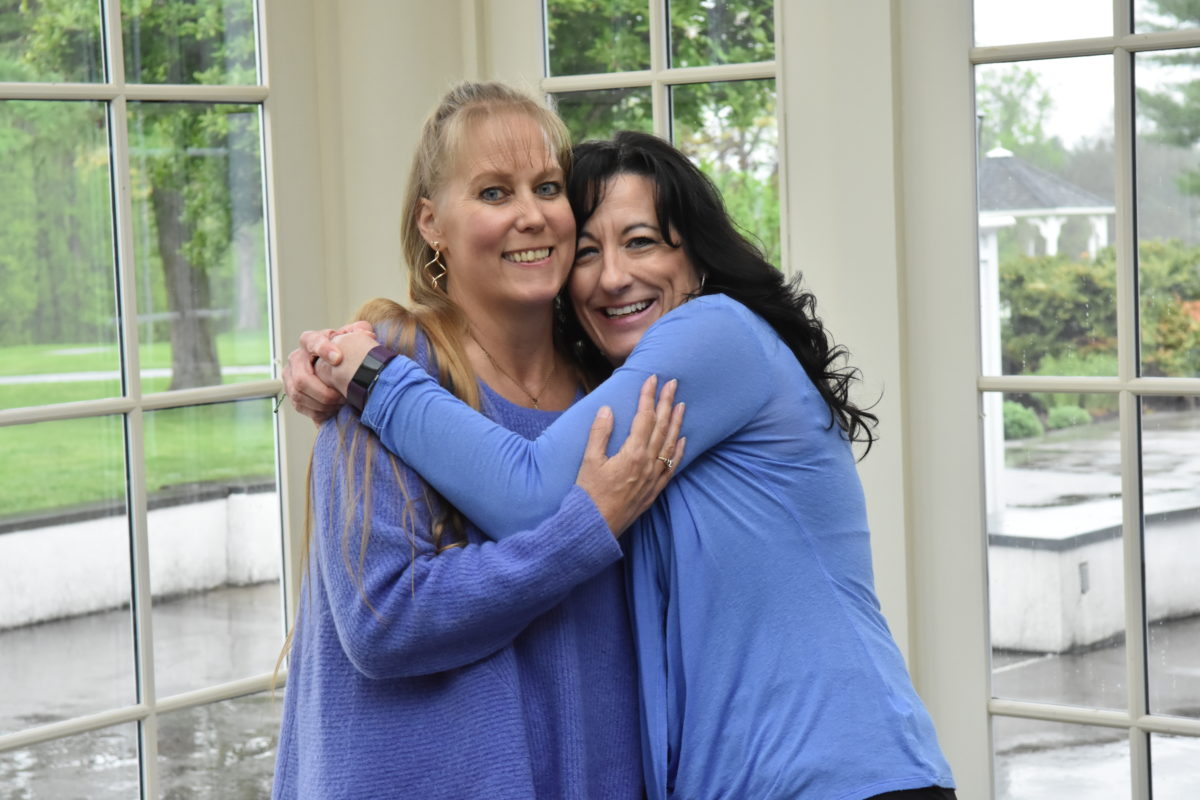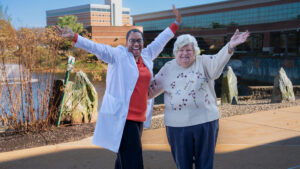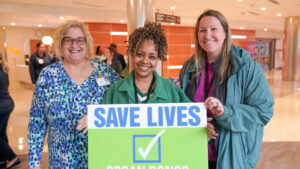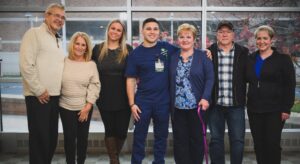Susan Murphy, a living donor, and Kim Sporay, recipient of a kidney, have a lot in common.
Both are classic car enthusiasts. Their husbands have been friends since the 1980s, when they were teenagers. The women live near each other in Middletown.
“I didn’t want to go to Philadelphia and I didn’t want to go to Baltimore. Christiana Care is 15 minutes from my house and that’s where I want to be.”
During a conversation by Sporay’s swimming pool, Murphy learned that Sporay was in kidney failure, relying on dialysis 10 hours a day, seven days a week. Her only option for a long-term solution was a kidney transplant.
Murphy thought about her closest friend, who had recently died of cancer.
“There was nothing I could do for my friend except offer moral support,” she said. “This time, I could do something.”
Sporay suffered from chronic glomerulonephritis, a condition characterized by long-term inflammation and scarring of the glomeruli, the microscopic structures in the kidney that filter blood and produce urine.
She was so ill that she could no longer enjoy going out on their boat with her husband or entertaining at the pool. Even basic activities such as doing laundry were a strain.
“I basically moved from the bed to the couch and that was my day.”
Living donor best option
Doctors advised her to pursue a kidney transplant. Sporay began working with the transplant team at Christiana Care, who provided her with the care and encouragement she needed while on the waiting list. Her estimated wait for a deceased donor was five years. Her best option was a live donor.
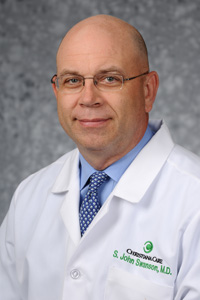
“With a living donor, the organ is less likely to be rejected,” said S. John Swanson, III, M.D., surgical director for the Kidney Transplant Program. “Another advantage is the kidney begins working faster and continues working longer. Patients also recover faster.”
As an only child, Sporay had few relatives to turn to. A few people volunteered to be tested but all were ruled out because of preexisting health conditions.
Sporay never asked Murphy. And Murphy never asked Sporay if she would like her to be tested. She simply volunteered.
“I knew there would be a lot of testing but I thought I would be a good candidate,” Murphy said. “I eat healthy, drink lots of water and walk a lot.”
Murphy worked with Emily Pruitt, MSN, the program’s living donor coordinator, to determine her eligibility. Rigorous testing confirmed that Murphy was in good health.
Clare Shumate, BSN, the transplant coordinator, guided Sporay through the process.
“Often, patients are scared and unsure of their future when they find out they have kidney disease. Our program sees them from the time they come in the door to be evaluated, until they are transplanted,” she said. “They become part of our family and our goal is to keep them as healthy as possible while they are waiting for transplant.”
Sporay was grateful to find respectful, expert care close to home.
“I didn’t want to go to Philadelphia and I didn’t want to go to Baltimore,” she said. “Christiana Care is 15 minutes from my house and that’s where I want to be.”
As the donor, Murphy got to pick the date of surgery: Aug. 16, 2016.
Sporay, after receiving the kidney
Sporay began feeling better immediately after the transplant. As she recovered, she reclaimed more of her life. She resumed working with her husband in the family boat repair business. And the couple is back to enjoying boating together.
“I run with my aunt and my mom. I can do my own laundry. Everyday life is a big thing.”
She is looking forward to celebrating her 50th birthday — and many more birthdays to come.
“Susan turned 50 last year, so my kidney turned 50 before I did,” she said.
Murphy, after donating to Kim
As for Murphy, she feels more conscious of the life-altering power of helping others.
“Kim is looking fabulous and enjoying her life,” she said. “It’s not scary to be an organ donor. I did my research, and it’s the best decision I ever made.”
Soon after donating, she was back to work as a bank officer for Wilmington Trust. But her interest in helping people with kidney disease did not end.
She is now an advocate for live kidney donation. She assembled a team of five to participate in the Kidney Walk in Philadelphia, raising $1,200.
“Helping others is the most wonderful feeling in the world,” she said.
Sporay concurs: “Our experience inspired one of my aunt’s neighbors to be a living donor. He is going through the testing phase now.”
